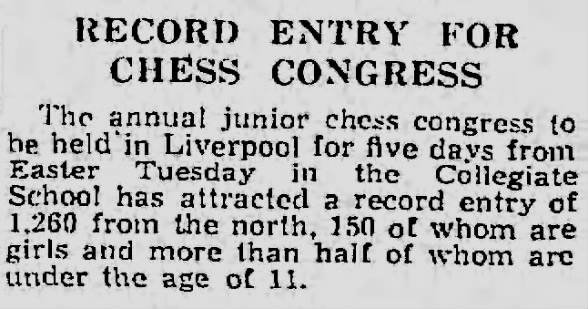 Chess 19 Mar 1959, Thu The Guardian (London, Greater London, England) Newspapers.com
Chess 19 Mar 1959, Thu The Guardian (London, Greater London, England) Newspapers.com
Chess
The Guardian, Chess, Thursday, March 19, 1959, Greater London, England Problem No. 517 By B. J. de C. Andrade...
Posted by Bobby Fischer's True History on Saturday, May 7, 2022
Problem No. 517 By B. J. de C. Andrade (Woodford).
Black (8)
White (12)
White mates in two moves.
FEN nq6/4R1N1/2B4Q/bpPn4/3k1rP1/NP4pK/4P3/2R1B3 w - - 0 1
Solution: 1. Qh5 Nb4 2. Bc3#
Chess masters who try to treat the game as an end in itself or a way of lite often crack under the strain of substituting abstract thought embodied in a man-to-man contest for normal social activity. Alekhine, Steinitz, Tarrasch, and Nimzovitch all had in common that they were outstanding teachers of the game, worked out their own theoretical methods for success in it, were passionate devotees of chess all their lives, yet ended as disappointed or even mentally sick men. Others, like Capablanca, Marshall, and, in our own day, Reshevsky and Smyslov, have become great players without having any coherent philosophy about it. In Emanuel Lasker, The Life of a Chess Master, by Dr J. Hannak (Andre Deutsch, pp. 320, 25s), which has now been translated by H. Fraenkel (Assiac of the “New Statesman”), it is clear that Lasker's uniqueness was that he had a positive approach to chess without ever letting it rule him.
World champion for 27 years, he was the most consistently successful player of all time; he regarded chess as a means of livelihood in which he could obtain success by bringing his opponents into highly critical positions where his mature and confident personality could stand the strain better. While Steinitz and Tarrasch were optimists who believed that chess success consisted of finding the absolutely best move, Lasker insisted that this was beyond human capacity. So when he met Capablanca and Tarrasch in matches there was a conflict of philosophies as well as of personalities; small wonder that neither was on speaking terms with Lasker for long periods.
Dr. Hannak's brilliant book, ably translated by Mr. Fraenkel, brings out Lasker's character in all its depth and complexity. I specially liked Tarrasch's greeting at the start of the match: “To you, Herr Lasker, I have only two words to say: check and mate.” Lasker's devotion to his wile (he believed that if she was in the room he could never lose), his unworldliness (he bought two pigeons for breeding, but forgot they were both cocks; his wife received flowers from him, but they had not been paid for), his ability to win vital, decisive games, his attempt to develop his theory of chess into a general philosophy all these facets of the man appear in vivid perspective. A hundred games, with notes from various sources, are also included. L. W. B.
 Emanuel Lasker 20 Mar 1959, Fri The Guardian (London, Greater London, England) Newspapers.com
Emanuel Lasker 20 Mar 1959, Fri The Guardian (London, Greater London, England) Newspapers.com
 Record Entry For Chess Congress 25 Mar 1959, Wed The Guardian (London, Greater London, England) Newspapers.com
Record Entry For Chess Congress 25 Mar 1959, Wed The Guardian (London, Greater London, England) Newspapers.com
RECORD ENTRY FOR CHESS CONGRESS
The annual junior chess congress to be held in Liverpool for five days from Easter Tuesday in the Collegiate School has attracted a record entry of 1,260 from the north, 150 of whom are girls and more than half of whom are under the age of 11.






















